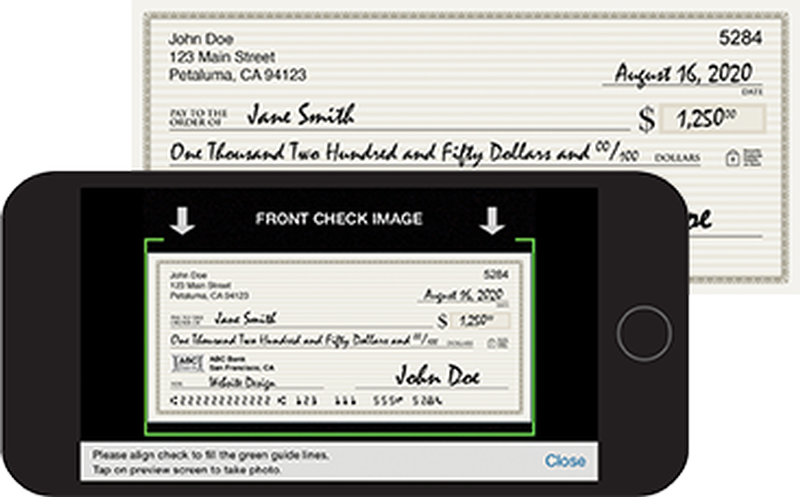-
New Market Bank Promotes Long-Time Team Members Ramola and Martin
Local, family-owned New Market Bank with locations in Lakeville, Prior Lake and Elko New Market, announced today the promotions of Karen Ramola and Robin Martin to vice president of retail banking and assistant vice president of human resources, respectively.
Read More -
New Market Bank Contributes Nearly $30,000 to the Community in 2020
Local, family-owned New Market Bank with locations in Lakeville, Prior Lake and Elko New Market, announced today that it contributed $29,685 to local nonprofit organizations, schools and community initiatives during 2020. The total, an increase of nearly $10,000 over 2019 community giving, includes bank donations, donations by employees and customers, which the bank matched, and sponsorships of various fundraising events and special requests. Over and above its financial contributions, New Marke
Read More -
New Market Bank Adds Fifth-Generation Family Member to Team
Family-owned New Market Bank, with principal offices in Lakeville, has hired Mikayla Drentlaw as a student teller. Drentlaw is the great-great granddaughter of Arnold Vogel, who took over the bank as president in 1913, and the daughter of current President Anita (Vogel) Drentlaw, CPA. The announcement comes as the bank marked its 115th anniversary on Thursday, June 10, 2020.
Read More -
New Market Bank Helps Nearly 180 Small Businesses Access Paycheck Protection Program in First-Round of Funding
“As a community bank, New Market Bank wants to help any eligible business in our area access relief programs, including the Paycheck Protection Program,” said Anita Drentlaw, CPA, president of New Market Bank. “As a small business ourselves, New Market Bank knows the challenges small businesses face. We’re committed to helping them and our communities remain as economically strong as possible through these tough times.”
Read More -
New Market Bank and ICBA: Build Wealth, Not Debt
Locally owned New Market Bank, with principal offices in Lakeville, and The Independent Community Bankers of America® (ICBA) want to remind consumers during America Saves Week that building a nest egg can help alleviate stress and provide additional financial security during times of unexpected financial hardship.
Read More -
New Market Bank 2019 Community Support Totals Nearly $20,000
“The heart of community banking is the community,” said Anita Drentlaw, CPA, president of New Market Bank. “We pride ourselves on supporting nonprofits in the south metro, many of which fly under the radar of corporate giving programs, because it improves the quality of life for the people we serve and the communities in which we live and work.”
Read More -
New Market Bank Hires Nemitz as Account Manager for Third Party Mortgage Originations and Mortgage Loan Officer
New Market Bank, a local, family-owned community bank, has hired Todd Nemitz as a mortgage loan officer and account manager for third party originations (TPO). With Nemitz’s hiring, New Market Bank extends its mortgage processing and servicing to customers of other financial institutions that do not have full-service mortgage capabilities.
Read More -
New Market Bank Hires Community Banking Veteran as Compliance Officer and VP of Loan Operations
Fourth-generation, family-owned New Market Bank has hired Jeff Jacobson as compliance officer and vice president of loan operations. Jacobson comes to the locally owned independent bank with more than 30 years of experience in the community banking industry.
Read More -
New Market Bank Launches Full-Service Mortgage Department
We’re pleased to announce we now have a full-service mortgage department, led by industry veteran Tom Hazlett.
Read More -
Protecting Your Digital Footprint
The goal of maintaining personal privacy is managing your digital footprint, i.e. - attempting to protect and limit what information is collected about you. Be aware that in today's digital world, it is almost impossible to eliminate your digital footprint or stop every organization from collecting information on you; we can only reduce it.
Download PDF -
Identity Theft - Protecting Yourself
Identity theft happens when a criminal steals information about you and uses that information to commit fraud, such as requesting unemployment benefits, tax refunds, or a new loan or credit card in your name. If you don’t take precautions, you may end up paying for products or services that you didn’t buy and dealing with the stress and financial heartache that follows identity theft.
Download PDF -
I’m Hacked. Now What?
No matter how secure you are, sooner or later you may have an accident and become hacked. Here are clues you might have been hacked and if so, what to do. If you suspect you have been hacked, stay calm; you will get through this.
Download PDF -
New Round of PPP Funding Available
The Economic Aid to Hard Hit Small Businesses, Nonprofits and Venues Act, signed into law December 27, 2020, included more funding for the SBA’s Paycheck Protection Program (PPP). Most community banks, including New Market Bank, will be in the second wave of lenders allowed access to the application portal. Once we know when our access opens, we will update our website and announce it on social media. According to the SBA, plenty of funds are available - there's no need to panic and apply immedi
Read More -
Meeting Customer Needs Both Digitally and In-Person
The unfortunate physical restrictions of 2020 as well as our culture’s ever-growing shift to digital platforms have increased New Market Bank’s need to serve our customers whenever, wherever, and however they prefer. Now more than ever, we must offer our customers a range of digital banking tools while still providing dedicated, in-person banking for those who prefer to stop by our physical locations in Lakeville, Prior Lake, and Elko New Market.
Read More -
Securing Wi-Fi at Home
To create a secure home network, you need to start by securing your Wi-Fi access point (sometimes called a Wi-Fi router). This is the device that controls who and what can connect to your home network. Here are five simple steps to securing your home Wi-Fi to create a far more secure home network for you and your family.
Download PDF -
Securing the Generation Gap
Trying to securely make the most of today’s technology can be overwhelming for almost all of us, but it can be especially challenging for family members not as used to or as familiar with technology. Therefore, we wanted to share some key steps to help secure family members who may be struggling with technology and might misunderstand the risks that come with using it.
Download PDF -
Virtual Conferencing Safely and Securely
With so many of us now working from home, you are most likely finding yourself remotely connecting with your co-workers using virtual conferencing solutions like Zoom, Slack, or Microsoft Teams. Your family members - perhaps even your children – may also be using these same technologies to connect with friends or for remote learning. Regardless of why you are connecting, here are key steps you can take to make the most of these technologies safely and securely.
Download PDF -
Social Engineering Attacks
A common misconception about cyber attackers is that they use only highly advanced tools and techniques to hack into peoples’ computers or accounts. Cyber attackers have learned that the easiest ways to steal your information, hack your accounts, or infect your systems is by simply tricking you into doing it for them using a technique called social engineering.
Download PDF -
Fake News
Generally speaking, fake news is a false narrative that is published and promoted as if it were true. Anyone with an agenda can publish falsehoods as if they were truths. The motivations as to why people create and distribute fake news are as numerous as there are individual opinions.
Download PDF -
Community Banking: The Treat That Keeps on Giving
Every now and then, a trick can draw a bit of glee (especially during Halloween). But no one likes to have the wool pulled over their eyes, especially when it’s a wolf disguised in sheep’s clothing. That’s why New Market Bank focuses on the “treats” that distinguish us as trusted lenders and keep our customers coming back for more.
Read More
 |
Call Us Today! 952-469-1600 |






